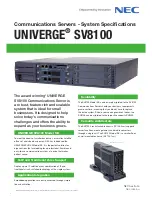
Chapter 7: BIOS
7-11
Parallel Port
This setting allows you to assign control of the parallel port. The options
are Enabled (user defined), Disabled and Auto (BIOS controlled).
Base I/O Address
Select the base I/O address for the parallel port. The options are 378,
278 and 3BC.
Interrupt
Select the IRQ (interrupt request) for the parallel port. Options are
IRQ5 and IRQ7.
Mode
Specify the parallel port mode. Options are Output Only, Bi-directional,
EPP and ECP.
DMA Channel
Specify the DMA channel. Options are DMA1 and DMA3.
Floppy Disk Controller
This setting allows you to assign control of the floppy disk controller.
The options are Enabled (user defined), Disabled and Auto (BIOS
controlled).
Base I/O Address
Select the base I/O address for the parallel port. The options are
Primary and Secondary.
Summary of Contents for 7042M-6
Page 1: ... SUPERSERVER 7042M 6 USER SMANUAL 1 0a SUPER ...
Page 5: ...v Preface Notes ...
Page 10: ...Notes SUPERSERVER 7042M 6 Manual x ...
Page 16: ...SUPERSERVER 7042M 6 Manual 1 6 Notes ...
Page 24: ...2 8 SUPERSERVER 7042M 6 Manual Figure 2 6 Accessing the Inside of the SuperServer 7042M 6 ...
Page 92: ...7 24 SUPERSERVER 7042M 6 Manual Notes ...
Page 98: ...A 6 SUPERSERVER 7042M 6 Manual Notes ...
















































